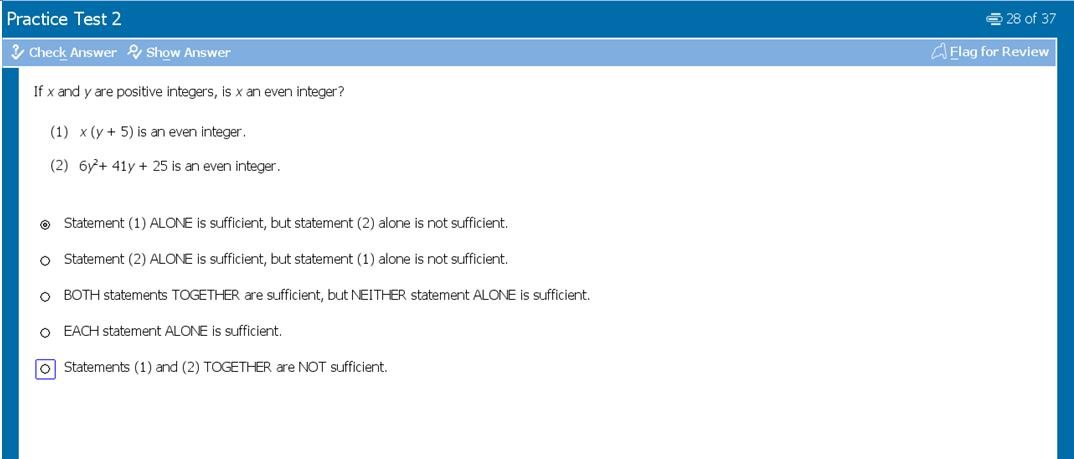Events & Promotions
|
|

GMAT Club Daily Prep
Thank you for using the timer - this advanced tool can estimate your performance and suggest more practice questions. We have subscribed you to Daily Prep Questions via email.
Customized
for You
Track
Your Progress
Practice
Pays
Not interested in getting valuable practice questions and articles delivered to your email? No problem, unsubscribe here.
- Nov 22
11:00 AM IST
-01:00 PM IST
Do RC/MSR passages scare you? e-GMAT is conducting a masterclass to help you learn – Learn effective reading strategies Tackle difficult RC & MSR with confidence Excel in timed test environment - Nov 23
11:00 AM IST
-01:00 PM IST
Attend this free GMAT Algebra Webinar and learn how to master the most challenging Inequalities and Absolute Value problems with ease. - Nov 25
10:00 AM EST
-11:00 AM EST
Prefer video-based learning? The Target Test Prep OnDemand course is a one-of-a-kind video masterclass featuring 400 hours of lecture-style teaching by Scott Woodbury-Stewart, founder of Target Test Prep and one of the most accomplished GMAT instructors.
Kudos
Bookmarks
E
Be sure to select an answer first to save it in the Error Log before revealing the correct answer (OA)!
Difficulty:
 45%
(medium)
45%
(medium)
Question Stats:
66% (02:00) correct 34%
(01:59)
wrong
34%
(01:59)
wrong  based on 1135
sessions
based on 1135
sessions
History
Date
Time
Result
Not Attempted Yet
If x and y are positive integers, is x an even integer?
(1) x(y + 5) is an even integer.
(2) 6y^2 + 41y + 25 is an even integer.

Question 28.JPG [ 40.19 KiB | Viewed 14438 times ]
(1) x(y + 5) is an even integer.
(2) 6y^2 + 41y + 25 is an even integer.
Attachment:
Question 28.JPG [ 40.19 KiB | Viewed 14438 times ]
Kudos
Bookmarks
Question moved to DS subforum.
If x and y are positive integers, is x an even integer ?
(1) x(y+5) is an even integer --> if y is an odd integer then y+5=even and x can be even or odd. Not sufficient.
(2) 6y^2 + 41y + 25 is an even integer --> 6y^2 + 41y + 25=even+41y+odd=even --> odd+41y=even --> 41y=odd --> y=odd, still insufficient as no info about x.
(1)+(2) As from (2) y=odd then from (1) x can be even as well as odd. Not sufficient.
Answer: E.
P.S.
If x and y are positive integers, is x an even integer ?
(1) x(y+5) is an even integer --> if y is an odd integer then y+5=even and x can be even or odd. Not sufficient.
(2) 6y^2 + 41y + 25 is an even integer --> 6y^2 + 41y + 25=even+41y+odd=even --> odd+41y=even --> 41y=odd --> y=odd, still insufficient as no info about x.
(1)+(2) As from (2) y=odd then from (1) x can be even as well as odd. Not sufficient.
Answer: E.
P.S.
! |
Please post PS questions in the PS subforum: gmat-problem-solving-ps-140/ Please post DS questions in the DS subforum: gmat-data-sufficiency-ds-141/ |
Kudos
Bookmarks
My answer is E.
1. is not sufficient , as the expression is satisfied for both o and e values of x.
2. no info about x. not sufficient
together y is odd, x can still be odd or even . so not enough
1. is not sufficient , as the expression is satisfied for both o and e values of x.
2. no info about x. not sufficient
together y is odd, x can still be odd or even . so not enough












